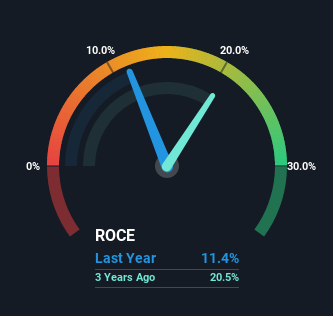- South Africa
- /
- Consumer Durables
- /
- JSE:BWN
Balwin Properties (JSE:BWN) May Have Issues Allocating Its Capital
Finding a business that has the potential to grow substantially is not easy, but it is possible if we look at a few key financial metrics. In a perfect world, we'd like to see a company investing more capital into its business and ideally the returns earned from that capital are also increasing. Basically this means that a company has profitable initiatives that it can continue to reinvest in, which is a trait of a compounding machine. However, after briefly looking over the numbers, we don't think Balwin Properties (JSE:BWN) has the makings of a multi-bagger going forward, but let's have a look at why that may be.
Return On Capital Employed (ROCE): What Is It?
For those who don't know, ROCE is a measure of a company's yearly pre-tax profit (its return), relative to the capital employed in the business. The formula for this calculation on Balwin Properties is:
Return on Capital Employed = Earnings Before Interest and Tax (EBIT) ÷ (Total Assets - Current Liabilities)
0.11 = R576m ÷ (R6.8b - R1.7b) (Based on the trailing twelve months to August 2022).
So, Balwin Properties has an ROCE of 11%. That's a relatively normal return on capital, and it's around the 9.6% generated by the Consumer Durables industry.
View our latest analysis for Balwin Properties

In the above chart we have measured Balwin Properties' prior ROCE against its prior performance, but the future is arguably more important. If you'd like to see what analysts are forecasting going forward, you should check out our free report for Balwin Properties.
What Does the ROCE Trend For Balwin Properties Tell Us?
In terms of Balwin Properties' historical ROCE movements, the trend isn't fantastic. To be more specific, ROCE has fallen from 34% over the last five years. Although, given both revenue and the amount of assets employed in the business have increased, it could suggest the company is investing in growth, and the extra capital has led to a short-term reduction in ROCE. If these investments prove successful, this can bode very well for long term stock performance.
In Conclusion...
While returns have fallen for Balwin Properties in recent times, we're encouraged to see that sales are growing and that the business is reinvesting in its operations. These growth trends haven't led to growth returns though, since the stock has fallen 13% over the last five years. So we think it'd be worthwhile to look further into this stock given the trends look encouraging.
If you want to know some of the risks facing Balwin Properties we've found 5 warning signs (2 don't sit too well with us!) that you should be aware of before investing here.
If you want to search for solid companies with great earnings, check out this free list of companies with good balance sheets and impressive returns on equity.
Valuation is complex, but we're here to simplify it.
Discover if Balwin Properties might be undervalued or overvalued with our detailed analysis, featuring fair value estimates, potential risks, dividends, insider trades, and its financial condition.
Access Free AnalysisHave feedback on this article? Concerned about the content? Get in touch with us directly. Alternatively, email editorial-team (at) simplywallst.com.
This article by Simply Wall St is general in nature. We provide commentary based on historical data and analyst forecasts only using an unbiased methodology and our articles are not intended to be financial advice. It does not constitute a recommendation to buy or sell any stock, and does not take account of your objectives, or your financial situation. We aim to bring you long-term focused analysis driven by fundamental data. Note that our analysis may not factor in the latest price-sensitive company announcements or qualitative material. Simply Wall St has no position in any stocks mentioned.
About JSE:BWN
Balwin Properties
Engages in the development and sale of residential properties in South Africa.
Proven track record with mediocre balance sheet.
Similar Companies
Market Insights
Community Narratives




